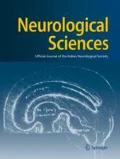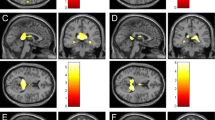Abstract
Fatigue is an overwhelming sense of tiredness or lack of energy, affecting both mental and physical domains. Fatigue is reported by about 50% of patients with multiple sclerosis (MS), and may be independent from depressed mood or weakness. Recently, the importance of distinguishing between subjective complaint and objective signs of fatigue has been emphasized, since the self-reported increase of subjective cognitive fatigue may not be related to a decline of cognitive performances. There is a general consensus that fatigue in MS is a central phenomenon, related to several factors. Neurophysiological studies revealed an impairment of volitional drive to the descending motor pathways and functional imaging studies indicated a selective involvement of frontal cortex and basal ganglia. Thus, the physiopathology of fatigue may rely on dysfunction of circuits involving thalamus, basal ganglia, and frontal cortex, which, affected by the MS lesions or disturbed in their function by the products of inflammation, could be the substrate of fatigue. The abnormal subjective fatigue observed in MS and perhaps in other neurological disorders could be due to a higher brain working load required to perform a given mental or physical activity, or to an internal overestimation of such load.
Similar content being viewed by others
References
Comi G, Leocani L (2002) Assessment, pathophysiology and treatment of fatigue. Exper Rev Neurotherapeutics 2:867–876
Krupp LB, Pollina DA (1996) Measurement and management of fatigue in progressive neurological disorders. Curr Opin Neurol 9:456–460
Paul PH, Beatty WW, Schneider R et al (1988) Cognitive and physical fatigue in multiple sclerosis: Relationship between self report and objective performance. Appl Neuropsychol 5:143–148
Vercoulen JH, Hommes OR, Swanink CM et al (1996) The measurement of fatigue in patients with multiple sclerosis. A multidimensional comparison with patients with chronic fatigue syndrome and healthy subjects. Arch Neurol 53:642–649
Stanton BR, Barnes F, Silber E (2006) Sleep and fatigue in multiple sclerosis. Mult Scler 12:481–486
Morris ME, Cantwell C, Vowels L, Dodd K (2002) Changes in gait and fatigue from morning to afternoon in people with multiple sclerosis. J Neurol Neurosurg Psychiatry 72:361–365
Gandevia SC, Allen GM, Butler GE, Taylor JL (1996) Supraspinal factors in human muscle fatigue: Evidence for suboptimal output from the motor cortex. J Physiol 490:529–536
Colombo B, Martinelli Boneschi F, Rossi P et al (2000) MRI and motor evoked potential findings in nondisabled multiple sclerosis patients with and without symptoms of fatigue. J Neurol 247:506–509
Tartaglia MC, Narayanan S, Francis SJ et al (2004) The relationship between diffuse axonal damage and fatigue in multiple sclerosis. Arch Neurol 61:201–207
Téllez N, Alonso J, Rio J et al (2008) The basal ganglia: A substrate for fatigue in multiple sclerosis. Neuroradiology 50:17–23
Marrie RA, Fisher E, Miller DM et al (2005) Association of fatigue and brain atrophy in multiple sclerosis. J Neurol Sci 228:161–166
Codella M, Rocca MA, Colombo B et al (2002) A preliminary study of magnetization transfer and diffusion tensor MRI of multiple sclerosis patients with fatigue. J Neurol 249:535–537
Roelcke U, Kappos L, Lechner-Scott J et al (1997) Reduced glucose matabolism in the frontal cortex and basal ganglia of multiple sclerosis patients with fatigue. Neurology 48:1566–1571
Leocani L, Colombo B, Magnani G et al (2001) Fatigue in multiple sclerosis is associated with abnormal cortical activation to voluntary movement-EEG evidence. Neuroimage 13:1186–1192
Thickbroom GW, Sacco P, Kermode AG et al (2006) Central motor drive and perception of effort during fatigue in multiple sclerosis. J Neurol 253:1048–1053
Perretti A, Balbi P, Orefice G et al (2004) Post-exercise facilitation and depression of motor evoked potentials to transcranial magnetic stimulation: A study in multiple sclerosis. Clin Neurophysiol 115:2128–2133
Liepert J, Mingers D, Heesen C et al (2005) Motor cortex excitability and fatigue in multiple sclerosis: A transcranial magnetic stimulation study. Mult Scler 11:316–321
Filippi M, Rocca MA, Colombo B et al (2002) Functional magnetic resonance imaging correlates of fatigue in multiple sclerosis. Neuroimage 15:559–567
Flachenecker P, Bihler I, Weber F et al (2004) Cytokine mRNA expression in patients with multiple sclerosis and fatigue. Mult Scler 10:165–169
Rocca MA, Agosta F, Colombo B et al (2007) fMRI changes in relapsing-remitting multiple sclerosis patients complaining of fatigue after IFNbeta-injection. Hum Brain Mapp 28:373–382
Mainero C, Faroni J, Gasperini C et al (1999) Fatigue and magnetic resonance imaging activity in multiple sclerosis. J Neurol 246:454–458
Giovannoni G, Thompson AJ, Miller DH, Thompson EJ (2001) Fatigue is not associated with raised inflammatory markers in multiple sclerosis. Neurology 57:676–681
Trojan DA, Arnold D, Collet JP et al (2007) Fatigue in multiple sclerosis: Association with disease-related, behavioural and psychosocial factors. Mult Scler 13:985–995
Author information
Authors and Affiliations
Corresponding author
Rights and permissions
About this article
Cite this article
Leocani, L., Colombo, B. & Comi, G. Physiopathology of fatigue in Multiple Sclerosis. Neurol Sci 29 (Suppl 2), 241–243 (2008). https://doi.org/10.1007/s10072-008-0950-1
Published:
Issue Date:
DOI: https://doi.org/10.1007/s10072-008-0950-1




